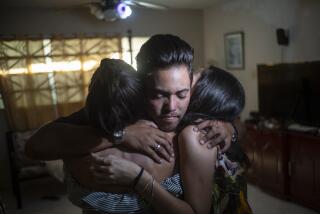Sandinistas Get More Cuba Aid, Havana Says
- Share via
HAVANA — Cuba is increasing military aid to Nicaragua’s Sandinista government after a U.S. congressional vote for $100 million in new American aid to anti-Sandinista rebels, a high Cuban official said Monday.
The official, Deputy Foreign Minister Ricardo Alarcon, told foreign reporters that Cuba is “doing everything in every area” to help the Sandinistas face an “escalation of U.S. action.” But he refused to give details of military aid increases--and he appeared to hint that Nicaragua does not need a great deal more of it.
“They have the people, and they have weapons to equip the people,” he said. “I think that they have what they need to fight.”
So far, Cuban military aid to Nicaragua has mostly been in the form of advisers and trainers, and Alarcon said their numbers have not increased. The Soviet Union is the main supplier of weapons to the Sandinistas.
June Aid Vote
The House of Representatives in June approved a Reagan Administration proposal for $100 million in aid to the contras, as the anti-Sandinista guerrillas are known. The measure is pending in the Senate, which is expected to approve it.
Cuba previously had announced that if U.S. aid for the contras increased, so would Cuban aid to the Sandinistas.
“We are doing that,” Alarcon said Monday. “I cannot give you details, but I can tell you that it is not a matter of plans or intentions, that as your side increases the help to the contras, we are doing our best to increase our help to the Sandinistas.”
Asked what aid was being increased, he reiterated: “I cannot give you the details. What I can tell you is that we are doing everything in every area through our own military to increase our cooperation with them to help them face the escalation of U.S. action.”
U.S. officials say Cuban military advisers in Nicaragua number 2,000 or more. Nicaraguan authorities have put the number at about 800. That number “hasn’t changed,” Alarcon said.
Weapons Training
“Our main contribution is in terms of advisers, especially to help them in terms of training in the manipulation or the use of those weapons that they receive from the Soviet Union,” he said.
Shipments of Soviet helicopters and other weaponry to Nicaragua are reported to have increased in the past three months. Cuba has helped relay Soviet weaponry to Nicaragua and has provided pilots to fly some helicopter gunships for the Sandinista army.
On another issue, Alarcon said that Cuba will refuse to discuss repatriation of Cuban criminals and mental patients in the United States until Washington provides clear U.S. radio channels for broadcasts from Havana.
He said that Cuba’s Communist government will not oppose U.S. broadcasts to Cuba on Radio Marti, which began transmissions in May, 1985, if “clear channels” are given to Havana so Cuban broadcasts can be heard throughout the United States.
The issue was discussed by U.S. and Cuban negotiators on July 8 and 9 in Mexico, but no agreement was reached and the talks were suspended.
Displacement Problem
Alarcon, who headed the Cuban delegation, said Monday that U.S. negotiators refused to consider providing clear channels for Cuban broadcasts on standard frequencies. Making such channels available would displace dozens of commercial stations in the United States, American officials have said.
U.S. officials have also said that the United States is willing to help Cuba find frequencies in the United States that already are clear. But the officials acknowledge that those frequencies would not give Cuba nationwide coverage.
Alarcon declared that Cuba has the technical capability and the right to respond to Radio Marti broadcasts with strong broadcasts of its own that would override or interfere with many U.S. stations. He added, however, that no decision to do so has been made, and he acknowledged that such a decision would cause serious complications in U.S.-Cuban relations.
In December, 1984, relations appeared to improve when the two countries signed an immigration agreement. The accord would have permitted the return to Cuba of about 2,700 criminals and mental patients who were among 125,000 Cubans brought to the United States in an improvised boatlift from the Cuban port of Mariel in 1980.
Former Prisoners
Under the agreement, the United States would have received about 3,000 former Cuban political prisoners and their families while beginning procedures to permit the immigration of up to 20,000 other Cubans annually.
Cuba suspended the agreement when the Reagan Administration began broadcasting news, commentary and entertainment to Cuba on Radio Marti.
Until last month, Cuban authorities had said the Radio Marti broadcasts must stop before the immigration agreement could be revived. But on Monday, Alarcon said Radio Marti is no longer the main issue for Cuba.
“They can continue wasting their money and their time with that toy as long as they wish--it’s their problem,” he said. But he said Cuba will insist on the reciprocal right to broadcast to the United States.
“There is absolutely no possibility, no chance to implement the immigration agreement unless and until we exercise that right,” he declared. And U.S. officials “should forget” any progress on other U.S.-Cuban issues until that condition is met, he said.
He argued that if the Reagan Administration believes in freedom of information, it should have no fear of Cuban broadcasts to the United States.
More to Read
Sign up for Essential California
The most important California stories and recommendations in your inbox every morning.
You may occasionally receive promotional content from the Los Angeles Times.













